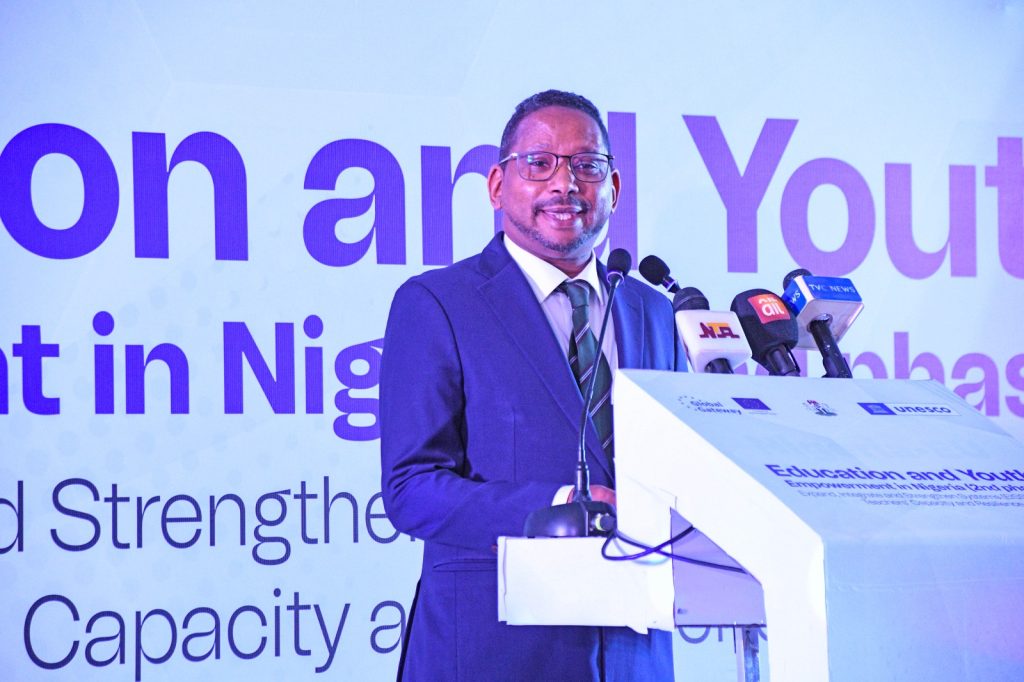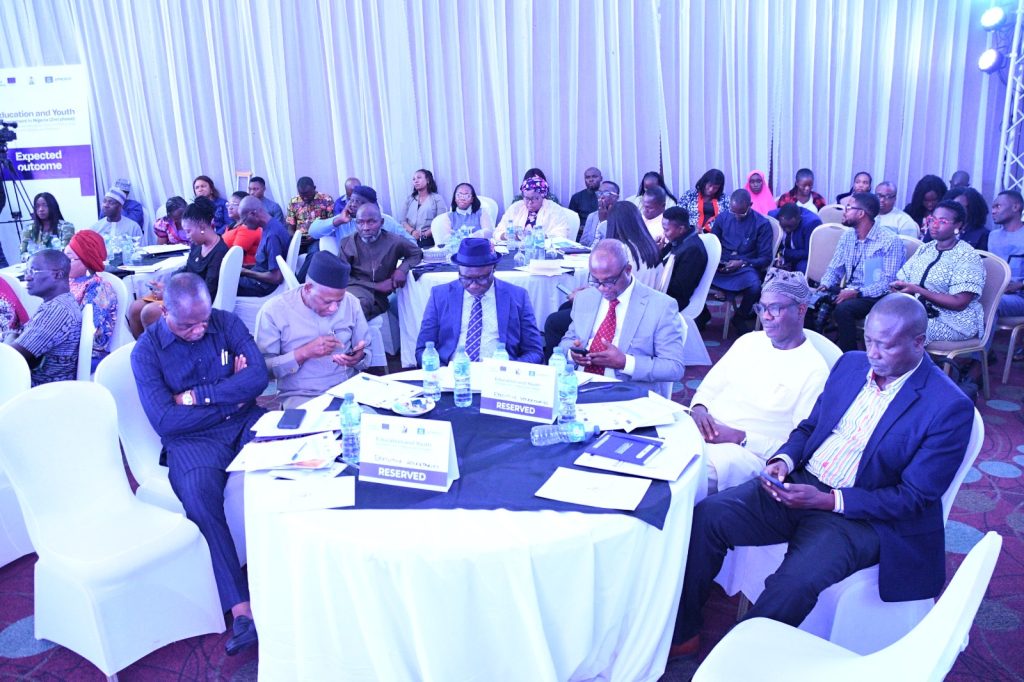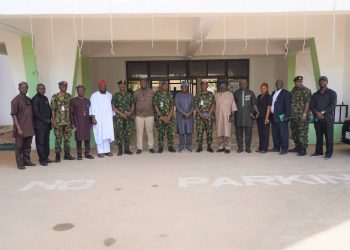By: Mnena Iyorkegh, Abuja
United Nations Educational, Scientific and Cultural Organisation (UNESCO) and the European Union (EU) have launched the second phase of its education programme – “Expand, Integrate and Strengthen Systems (EISS),” to review, strengthen and implement education policies and programmes to build the capacity of teachers in Nigeria.
Speaking at the launch, the Head of Office, UNESCO, Abuja, Mr. Abdourahamane Diallo noted that the 2021 Education Sector Analysis by the Federal Government of Nigeria in collaboration with UNESCO IIEP, which assessed the status of education in the States of Oyo, Adamawa, and Katsina states, reported that at least 20% of teachers in public basic education schools are not qualified to teach, and this number is nearly double in private schools. Which calls for urgent attention to address the challenge and bridge the existing gap.

He said that: “this project is therefore timely as it seeks to address early and frequent loss of skilled teachers to more lucrative professions due to opaque teacher recruitment and deployment policies, by strengthening Government capacities to assess teaching needs and developing strong, evidence-based policies in relation to teacher recruitment, deployment, management, and professional development”. He said
Mr. Diallo, revealed that the specific objectives of the project are: To review, strengthen and implement education policies and programmes by addressing teacher shortage and work conditions; reinforce and support individual teacher capacities (in-service and pre-service) by developing an expanded teacher education programme with a focus on resilience in fragile context; and build better teacher connections to their students and colleagues in the communities.

The EU Ambassador to Nigeria and ECOWAS, Ms Samuela Isopi, explained that the second phase of the programme which focuses on teachers, complements the first phase, Education and Youth Empowerment in North Western Nigeria, launched in 2023.
Noting that the funding for both phases amounts to €45.4 million, under the Global Gateway Strategy to boost smart, clean and secure connections in digital, energy and transport sectors. It will also strengthen health, education and research systems across the world.
Isopi, who was represented by EU’s Head of Human Development, Leila Ben Amor Mathieu, disclosed that the EU under EISS would partner with six training colleges in Adamawa, Bayelsa, Enugu, Katsina, Plateau and Oyo, to in turn reach out to a wider pool of teachers.
She said: “Why focus on teachers? Because teachers are the bedrock of education. They are the ones who inspire, nurture, and guide our future generations Investing in teachers is investing in our collective future. All over the world they play an essential role in shaping the minds and hearts of the next generation.
“However, in many countries, and in Nigeria in particular, teachers face numerous challenges, ranging from insufficient resources to the pressures of adapting to rapidly changing educational environments.
According to her, the European Union has identified with the government the critical need to support Nigerian teachers in their professional development and personal resilience.
By empowering teachers, we are not only enhancing the quality of education but also ensuring that students receive the guidance and support they need to succeed in an ever-changing world. Specifically, the initiative will fund the development and review of education policies and career paths for the teaching profession in Nigeria; It will also ensure that teachers’ capacity and resilience are enhanced through pre-service and in-service teachers education programmes as well as strengthen teacher-student collaboration and learning teams at school and community levels.
UN Resident Coordinator, Mohammed Fall while commending Nigeria’s effort to meet up with SDG goals, however lamented the high number of inadequate trained teachers in schools
He said: “The UNESCO Global report on Teachers 2023, notes that teacher attrition is a global concern: between 2015 and 2022, attrition rates of primary education teachers doubled around the world from 4.6 to 9 per cent. Regardless of the country’s income level, and even remuneration, teachers are leaving the profession within the first five years of practice. We must halt this worrisome trend. we must match our words with action as time is running out.
He further reiterate UN’s commitment to act to accelerate achievement of SDG4 by re-orienting UN cooperation and scaling evidence-based approaches.
“We are committed to accompanying government in the implementation of the Education Sector Roadmap 2024-2027 to provide quality education for all and produce highly skilled workforce, particularly in system strengthening through sector planning and strengthened EMIS; promoting access to formal and non-formal education; skills and lifelong learning; and teacher professional development, which is the focus of the project we are launching today”.
Nigeria’s Minister of Education, Professor. Mamman Tahir, maintained that teachers represents a significant milestone in the collective efforts to transform the educational landscape in Nigeria.
Represented by the Director Basic Education, Dr. Folake Olatunji-David, he commended the funding support from the EU, the technical support of UNESCO as well as the commitment of all the state governments involved in the programme.
“We all know that education is a cornerstone of national development and it is only through a well structured and resilient education system that we can achieve the sustainable goal.”
The Minister added that the project was aimed at improving student attainment and contribute to Nigeria’s human development through an increase in the number of qualified and resilient teachers, as well as help in addressing the challenges confronting teachers in the country.
“We understand the challenges our teachers face, especially in fragile and demanding environments, such as ours. This project will provide them with the tools and support they need to excel. By strengthening our teachers and the teachers education programmes and implementing robust teacher policies, we can ensure that our teachers are well prepared, they are adequately recruited, deployed and managed.”
The Minister restated the Nigerian government’s commitment to ensuring every child has access to quality education.












